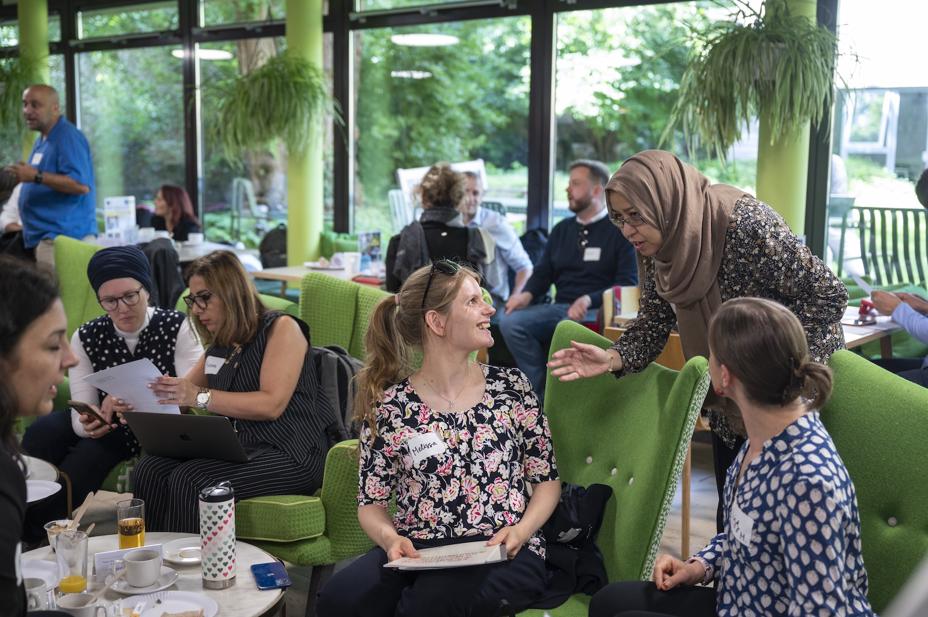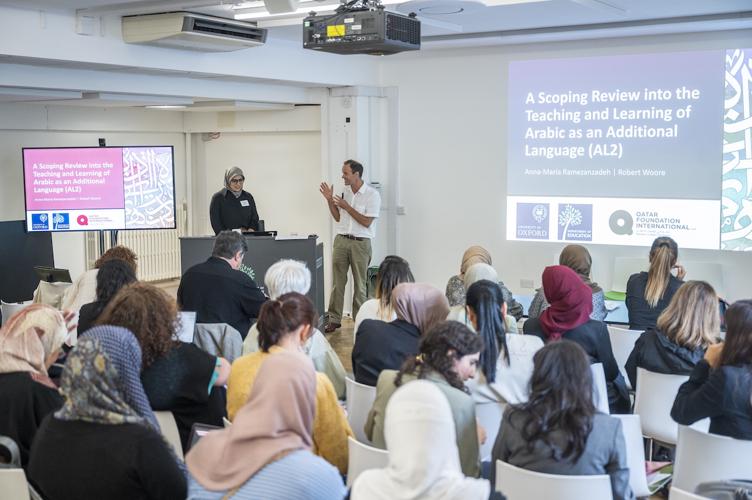
Something went Wrong
Try entering your email again or contact us at support@qfi.org
Try entering your email again or contact us at support@qfi.org
You’ll receive an email with a confirmation link soon.
May 21, 2025
By Kamilia Rahmouni
In 2024, I had the opportunity to attend the Oxford/QFI Research Forum: Research to Practice: Teaching Arabic in Schools event hosted at the University of Oxford, where I connected with a powerful way to uplift the Arabic language and solidify its value on a global scale.
In a reflective piece penned after my participation in the Oxford/QFI Research Forum, I pondered the foundational aims of academic research and the critical relationship between research and its practical application, particularly within the field of Arabic instruction which represented the main theme of the Forum. The Forum brought together key stakeholders from the teaching and learning of Arabic community with the aim of bridging the gap between research and practice. I concluded my reflection with an initial exploration of the importance of publishing and disseminating scholarly work in Arabic - an exploration I now intend to deepen and expand upon in this post.
I deeply believe that the dissemination of academic research on Arabic linguistics and pedagogy in Arabic is not simply a matter of scholarly preference, but a vital step towards supporting the language’s vitality and visibility by promoting and nurturing its use in academic circles and scholarly dialogues. In an age where linguistic diversity is celebrated, yet monolingual hegemony persists, using Arabic as a medium of academic research is necessary to cultivate and maintain a robust intellectual ecosystem where the Arabic language thrives not only as a medium of communication but also as a vessel of impactful academic research.
Admittedly, the scarcity of well-established journals in Arabic might constrain the global visibility of such research, yet every impactful journey begins with deliberate, incremental steps. The adoption of bilingual publications, or at least the inclusion of summaries in Arabic, can serve as effective bridges that connect Arabic scholarship with a global audience. By facilitating the integration of the language into the international academic discourse, we pave the way for the future creation of widely recognized journals in Arabic - a step that is much needed in order to empower local scholars and educators by giving them a platform to contribute to global discussions about their own language in their own language and on their own terms.
As we strive to realize these aspirations, we can, in the interim, utilize the multiple tools that this digital era offers. As I discussed in my previous post, we can move beyond the traditional barriers of paywalled and often restricted academic publications by leveraging technology which puts at our disposal various digital platforms that allow us to democratize knowledge and bypass linguistic hegemonies. When we publish research about Arabic pedagogy in Arabic, we ground the scholarship within the cultural and intellectual environment of the language, and we create more culturally relevant pedagogies that are better suited to the evolving needs of Arabic learners.
In the end, let us remember that enhancing the academic stature of Arabic is not only about increasing its viability and visibility but also about affirming its intrinsic value, showcasing its potential to contribute richly to the global exchange of ideas, and giving its fields of knowledge presence and due appreciation. As stakeholders in the field of Arabic studies, it is our responsibility to advocate for and contribute to the growth of academic literature in Arabic and to lay the groundwork for a richer and more inclusive academic future.
Kamilia Rahmouni is an assistant professor at the School of World Studies at Virginia Commonwealth University. Her interdisciplinary research interests include sociolinguistics, the use of AI in education, second language acquisition and teaching, discourse analysis, and curriculum design and development.
Submit Your Blog
We invite educators, researchers, and professionals in Arabic education to share their insights with our global community. Whether you teach, conduct research, or support Arabic language learning, your voice can spark innovation, drive change, and deepen understanding in the field of Arabic education.
Disclaimer: The views and opinions expressed in this blog are those of the author and do not necessarily reflect the views of Qatar Foundation International (QFI). While QFI reviews guest contributions for clarity and to ensure the content is valuable for our audience, the accuracy and completeness of the information are the responsibility of the author.



